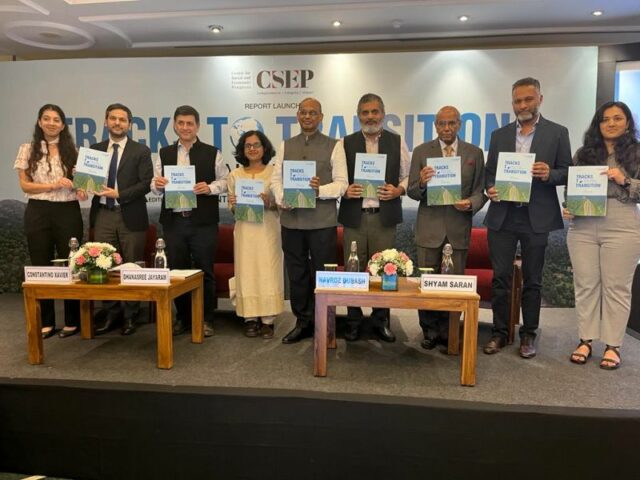NEW DELHI: India’s Ministry of External Affairs needs to have a very strong and focused approach towards climate change, believes former foreign secretary Shyam Saran.
That is because “at the end of the day, these negotiations are intensely political negotiations… what is being done on the negotiating floor is an intensely political kind of game being played,” feels Saran, who was also former Prime Minister Manmohan Singh’s special envoy on climate change.
Addressing a panel discussion during the launch of ‘Tracks to Transition: India’s Global Climate Strategy’, a report prepared by the Centre for Social and Economic Progress (CSEP), Saran argued that “therefore, while your technology aspect, your data aspect, the kind of concerns they have — those are absolutely important, but how they are then brought to the negotiating table and how you play the game is something which the Ministry of External Affairs has to be very, very closely involved.”
Edited by CSEP Fellow Constantino Xavier and Karthik Nachiappan, Research Fellow, National University of Singapore, and Non-Resident Fellow, CSEP, the 103-page report features seven case studies by experts who examine India’s position on four main tracks of global climate cooperation, and offers “research-based, actionable foreign policy options to accelerate India’s green transition and facilitate the road towards its 2030 commitments and its 2070 net zero target.”
“The report (also) calls for the creation of a special envoy—I’ll call it ‘climate czar’ because that’s more neutral, it’s both outside and inside—is essential for us to move ahead on the climate debate,” said the Director General of the International Solar Alliance, Ajay Mathur, who delivered the keynote address.
“The report brings together the strategy for pulling together the outreach agenda… (and) we hope it enables and stimulates conversation to create all kinds of initiatives that are necessary,” he said. Over the years, as India evolved from a developing country to a developing economy to a key player in a geopolitical bloc, “our climate negotiation approach became a little more nuanced… the international negotiating strategy became more enmeshed with internal development goals and policies.”
In his opening remarks, CSEP President Laveesh Bhandari said the report “emphasises that India has been more than a mere participant in the global climate discourse; it has been an innovator, contributing to novel solutions.”
Bhandari also wrote the preface to the report, where he argues that “Climate change, more than ever, underscores the need for collaborative efforts, even as it tests the limits of international diplomacy and governance.
“The United Nations system, traditionally a cornerstone of global cooperation, faces fragmentation, while multilateral development banks grapple with the need for reforms. In this evolving landscape, the path towards effective climate action becomes increasingly challenging for India and its partners, especially in the Global South.”
Others who spoke at the launch and subsequent panel discussion included Navroz Dubash, Professor, Centre for Policy Research; and Dhanasree Jayaram, Assistant Professor, Department of Geopolitics and International Relations, Manipal University. Adriana Abdenur, Special Advisor in the Presidency of the Republic of Brazil, sent a video address, where she spoke about the convergence of interests on climate change between India and Brazil.
Dubash spoke of the need for “a knowledge institution that looks at synergies and trade-offs between low carbon future and development, while Jayaram said there was “another layer to the diplomacy — which is like transnational diplomacy, which is beyond the state, beyond governments. Because what you see today is that you have a lot of sub-national actors” including cities and states, which had their own action plans on climate change.
According to the report, “the ongoing shift in the global balance of power and rising tensions over the international order are creating fissures. Rising and middle powers are showing signs of growing frustration with global institutions as well as the apathy of the United States towards the World Health Organization (WHO) and the WTO, which allegedly do not advance American interests or perform credibly. As a response, these powers are resorting to create and back new mechanisms that they can control and wield.”
Under these circumstances, Delhi has “also driven the cooperation of new climate institutions. For instance, the International Solar Alliance (ISA) with France, to accelerate global solar adoption, and the Coalition for Disaster Resilient Infrastructure (CDRI), to reduce the damage to critical infrastructures.”
As Saran put it, when it comes to climate change, India is doing what it can, without compromising on its national interests.
Also see:
















